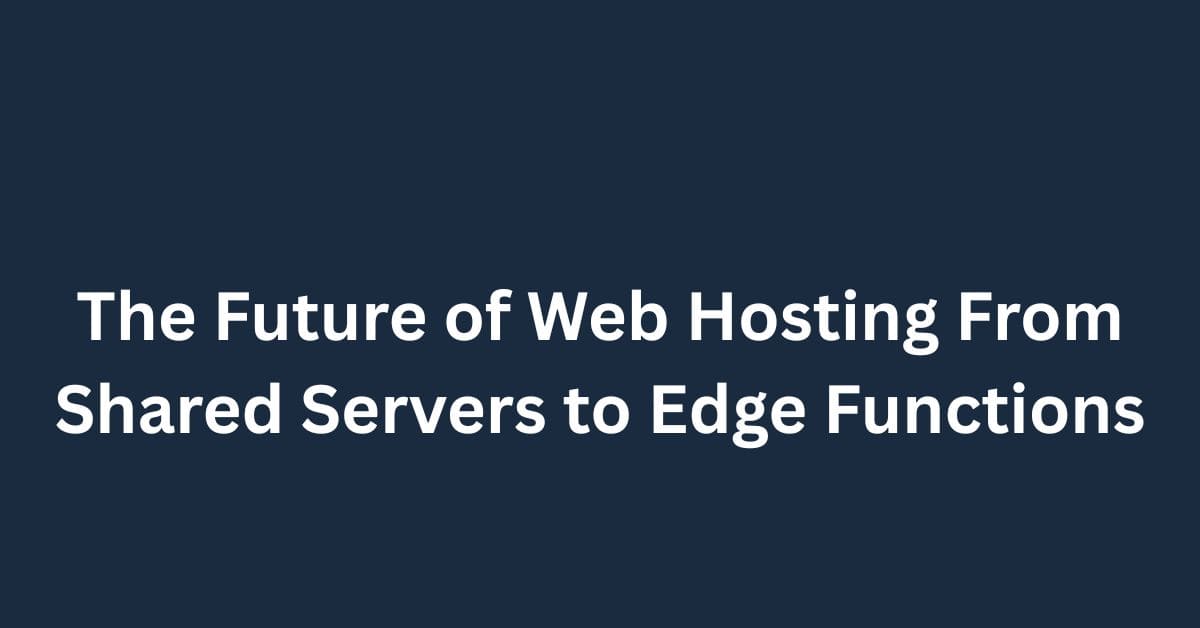|
Getting your Trinity Audio player ready... |
Published on: Makemychance.com
🚀 Introduction
Web hosting has come a long way from the days of slow, shared servers. In 2025, a silent revolution is happening: websites and apps are moving closer to the user — literally. Welcome to the era of Edge Functions — the next big step in web hosting.
But what does this mean for developers, businesses, and users?
🧠 What Are Shared Servers — and Why They’re Outdated?
In traditional shared hosting, multiple websites live on the same server. It’s affordable but:
- Slows down under load
- Has limited resources
- Often lacks scalability
For years, this was the go-to choice for small businesses and blogs. But with modern web applications needing speed, security, and real-time updates — this model is no longer enough.
⚙️ The Shift: From Centralized to Edge-Based Hosting
Platforms like Vercel, Netlify, Cloudflare, and AWS Lambda are changing the hosting landscape with edge computing and serverless functions.
Here’s how it works:
- Instead of deploying your code on one centralized server, edge platforms run it at data centers around the world
- This reduces latency (loading time) by executing code closer to the user
- It supports instant scaling without managing a server
🆚 Edge Hosting vs Traditional Hosting
| Feature | Shared Hosting | Edge Functions |
|---|---|---|
| Speed | Moderate to slow | Ultra-fast (low latency) |
| Scalability | Limited | Auto-scaling (globally) |
| Server Management | Manual | Serverless (hands-free) |
| Best For | Static websites | Dynamic apps, APIs |
🌐 Real-World Platforms Using Edge Functions
- Cloudflare Workers – Deploy JS logic at the edge for fast API responses
- Vercel Edge Middleware – Run authentication, rewrites, etc. instantly
- Netlify Edge Functions – Personalize content based on region
- AWS Lambda@Edge – Customize CDN delivery with dynamic logic
🧪 Edge hosting isn’t just fast — it’s smart. You can serve region-based content, run AB testing, or personalize pages in real time.
🔒 Security Benefits
Edge computing also means better DDoS protection, reduced attack surface, and data separation. Since requests don’t always need to hit your origin server, your core data stays safer.
📈 SEO + Performance Impact
Google’s Core Web Vitals (especially LCP and FID) reward fast, responsive sites. Edge hosting helps you:
- Reduce Time to First Byte (TTFB)
- Improve global content delivery
- Serve cached and dynamic content instantly
This can lead to better rankings and lower bounce rates.
🧩 Should You Switch?
If your site is:
- Heavy on user interaction
- Serving a global audience
- Running API-heavy apps or eCommerce
… then yes, edge hosting is worth it. But if you’re running a simple blog or static page, traditional or managed WordPress hosting may still do the job — for now.
🔗 Related Articles
- Low-Code Platforms for Web Apps: A 2025 Guide
- Top 5 Platforms & Tools for Custom Web App Development in 2025
✅ Final Thoughts
The web is moving to the edge — not just figuratively, but physically. As users expect faster and smarter experiences, edge hosting provides the speed, flexibility, and scale required in 2025 and beyond.
For developers and businesses, the future of hosting is already here — and it’s distributed.

Arsalan Malik is a passionate Software Engineer and the Founder of Makemychance.com. A proud CDAC-qualified developer, Arsalan specializes in full-stack web development, with expertise in technologies like Node.js, PHP, WordPress, React, and modern CSS frameworks.
He actively shares his knowledge and insights with the developer community on platforms like Dev.to and engages with professionals worldwide through LinkedIn.
Arsalan believes in building real-world projects that not only solve problems but also educate and empower users. His mission is to make technology simple, accessible, and impactful for everyone.
Join us on dev community



